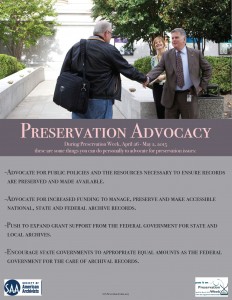So, next week is Preservation Week! What is your library doing to prepare/celebrate/advance preservation concerns? What is Preservation Week, you might ask? From ALA:
In 2005 the first comprehensive national survey of the condition and preservation needs of the nation’s collections reported that U.S. institutions hold more than 4.8 billion items. Libraries alone hold 3 billion items (63 percent of the whole). A treasure trove of uncounted additional items is held by individuals, families, and communities. These collections include books, manuscripts, photographs, prints and drawings, and objects such as maps, textiles, paintings, sculptures, decorative arts, and furniture, to give just a sample. They include moving images and sound recordings that capture performing arts, oral history, and other records of our creativity and history. Digital collections are growing fast, and their formats quickly become obsolescent, if not obsolete.
The Importance of Preservation Awareness
Some 630 million items in collecting institutions require immediate attention and care. Eighty percent of these institutions have no paid staff assigned responsibility for collections care; 22 percent have no collections care personnel at all. Some 2.6 billion items are not protected by an emergency plan. As natural disasters of recent years have taught us, these resources are in jeopardy should a disaster strike. Personal, family, and community collections are equally at risk.
ALA encourages libraries and other institutions to use Preservation Week to connect our communities through events, activities, and resources that highlight what we can do, individually and together, to preserve our personal and shared collections.
@ Your Library is doing some cool stuff too!
The Society of American Archivists is promoting preservation with this poster (which you can download):
Also, did anyone notice how Preservation Week runs right into MayDay? Click on the link for ideas for activities that your library can do to make sure it’s prepared for any emergency.


